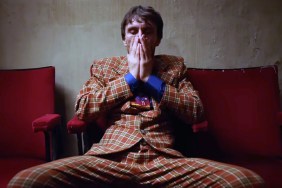One of the movies that’s sure to wind up on many Top 10 lists at the end of the year is the indie comedy (500) Days of Summer, which got one of the strongest reactions at this year’s Sundance Film Festival for its clever look at the varying stages of a relationship through the journey of Joseph Gordon-Levitt’s Tom Hansen, a mild-mannered greeting card writer who falls for his boss’ assistant Summer Finn, played by Zooey Deschanel. The movie, directed by Marc Webb (who we spoke to over the summer if you want to check out that video interview), follows their relationship through the good and the bad times, jumping back and forth between the good times and inevitable break-up that leaves Tom devastated.
The hilariously clever film came out of a spec script written by Scott Neustadter and Michael H. Weber, two young work friends who decided to do a bit of writing together and have since become two of the go-to guys in Hollywood for punching up scripts because of the impressive job they did with “(500) Days.”
ComingSoon.net has an exclusive behind-the-scene extra from the DVD and Blu-ray, coming out tomorrow, December 22, which shows you how just one of the unique ways they went about telling the story – in this case, using a sort of 1960s educational video to show why Tom was in love with summer.
Knowing that the movie was loosely based on Scott’s own experiences, we realized they’d be fun to talk to and get a little more into how the movie was made, so we met up with Scott (on the left) and Michael (on right) at a coffee shop in the East Village, ironically mere blocks away from this writer’s own “Summer,” and talked about a variety of things besides the movie. It turns out that they have some great anecdotes for young prospective screenwriters, of which I’m sure there must be a few out there among our readers. (Though we probably should have resisted, we did ask the guys how their names could wind up on a great movie like this one, as well as one that some might consider the worst of the year, Sony’s Pink Panther 2. It’s all explained below!)
CS: I’ve talked to a lot of writing partners over the last couple years, so how did the two of you start writing together?
Michael Weber: We met working at Tribeca. Scott hired me as an intern in 1999. When I graduated Syracuse, I went back to work at Tribeca, Scott was Director of Development, and I worked for De Niro personally. I was on and off there for about seven years. We weren’t working very hard at our jobs and we spent a lot of time telling jokes and playing cards and talking about girls and we were just making ourselves laugh and we kept saying, “We should be writing this down.” That’s really kind of how it all started, sitting up on the roof of the Tribeca Film Center.
Scott Neustadter: We were writing scripts together up there, and nothing happened with that, and I said, “I think I’m done with this” and I actually went to business school. I left and moved to London and I was done with the industry, and I wasn’t going to be doing anything, and that’s where I met my Summer. That was the thing. It was like “Okay, we’re going to try to do this one more time to do this writing thing because I had to exorcise the demons and that was the script and it sort of took off from there.”
CS: How long ago was that? Because Marc told me that it was hard to get a studio to back the movie and that you’d had the script for a while before he came on board.
Neustadter: We finished it in like ’04. It probably took us six months to show it to anyone because it was a little personal. We finally did, got a lot of attention and it helped us get into some doors, but nobody wanted anything to do with it, because it’s kind of a weird script. Luckily, the producers Mason Novick and Jessica Tuchinsky who really loved it and sort of said, “We’re going to get Searchlight to take a chance.” They optioned it for no money at all, and it didn’t become a real thing until Marc said he loved it and he wanted to do it. Then the avalanche started…
CS: Searchlight was involved even before Marc?
Neustadter: Yeah.
Weber: Searchlight hired Marc.
CS: Interesting. Did they have trouble finding a director up until that point because they thought it might be a hard script to film?
Neustadter: You know, we had a lot of people who were interested in doing it. I think they didn’t want to do it if it was never going to get made and at this moment, when they were looking for directors–I’m sure Marc would say the same thing–the idea that someone was going to make this was pretty foreign.
CS: Which is surprising considering how many people love the movie who have seen it.
Neustadter: You look back on it and it makes sense, but at the time, no one bought it, no one wanted anything to do with it. It sat around forever. Everyone says to us now, “If we had a chance, you would have made it.” But when Marc came on, he was a guy who people were beginning to send projects to and he said, “This is what I want to do. I don’t care if it gets made or doesn’t get made. I want to work on this.” With Marc involved, we did one more round of changes, pretty miniscule but effective, and then that got the actors involved and once Searchlight had their cast, they said, “Okay, we’re going to do it.”
Weber: For us though, it wasn’t until cameras were rolling that we really believed, “Okay, this is actually happening.”
Neustadter: They don’t give greenlights; we never got a greenlight. Three weeks in and we were still not sure. We got a call one day saying “Okay, we’re going to start spending money.” I don’t know what that means. Is that a greenlight? “No, things can still go wrong but we’re going to spend money on a casting director.”
Weber: Every time there was good news, it wasn’t that there was bad news, but there was just a “but.” So “we have a director BUT if there’s not a cast there’s no movie.” “We have a lead but if we can’t get the budget…” There’s always a “but” so really until it starts, you’re still thinking, “Okay, they’re going to take this away from us.”
Neustadter: They couldn’t make the make-up or hair person deal a couple weeks before, and it looked like it was going to derail the entire film. We thought for sure we were dead. It’s always that kind of thing.
CS: The good thing is that in Hollywood, you turn around and you can run into a make-up or hair person.
Neustadter: They got what they want.
Weber: We even had our joke. Like this was the second or third day they were shooting and they were doing the scene in the copy room when they were kissing. We were on set and watching on the monitor far away…
Neustadter: I have no idea if we’re even allowed to tell this story, but we’re going to tell it anyway.
Weber: Okay, I’ll tell it anyway.
CS: The movie’s already made. They can’t pull it away from you anymore.
Weber: Good point. We’re watching on a monitor far, far away. We know. We’re happy to be there and our place is to be not seen and not heard. We’re tucked away in a corner and we’re super-psyched to be there watching a monitor. And they kiss and Zooey walks away and we didn’t know it at the time but her heel broke and she just fell out of the frame. Oh my God!
Neustadter: All we hear is yelling and screaming and a loud fall and we were like, “Oh my gosh! Is she going to break her leg?”
Weber: We turned to each other and we were like, “They are going to pull the plug on the movie, it’s over. Everyone go home.”
Neustadter: If she broke her leg, they could not film. She was fine, totally fine.
Weber: We were just so nervous that even when the movie started, we thought “is this really happening” and the slight little… it was nothing but we even thought then, “Okay, they can take this away from us even now.”
CS: Since this was based on Scott’s experiences in England and you hadn’t worked together in a while, did he just call up and say, “Hey, I have this idea. I want to write about this girlfriend…”
Weber: The funny thing is that we would sit around and talk about these things anyway for hours on end even if we weren’t writing about it. Even when we do, we get no work done when we’re together because we sit around talking about my date last night and he just got engaged and we’re talking about all these things.
Neustadter: There was this stellar Email, like I had this weird breakthrough. We always wanted to write this kind of a movie, a romantic comedy that was sincere and not built around that ridiculous obstacle that all these other movies seem to be based on. “If only they had that conversation, then they all would be fine.” We didn’t want to do that. We wanted to do authenticity, and I was going through this stuff, but we still wouldn’t have written anything about it. It would have been a diary entry. Until I had this weird idea of “(500) Days of Summer.” I think at the time it was “(480) Days of April”
Weber: 318, or something like that.
Neustadter: I Emailed Weber at 3 in the morning and said, “Don’t you think this will be a cool way to tell this story”… and literally, the Email was…
Weber: You had rented “Glenn Gould.”
Neustadter: I had rented “32 Short Films about Glenn Gould,” which I still have never seen and I looked at the box and had a breakthrough: “That would be a neat way to tell a relationship story, do it out of sequence.”
Weber: From there, we just started charting relationships: “Boy meets girl…”
Neustadter: We did three areas of interest, which is anything we could think about the beginning parts of a relationship.
Weber: Getting to know them… the way up the mountain…
Neustadter: Then you have your second tier which Weber was responsible for, which we never used (laughs)… the happy stuff…
Weber: The comfortable… in a relationship… what’s the quote?
Neustadter: The Sydney Pollack quote? He was saying, and I’m paraphrasing, “People want to see a couple fall in love and fall out of love. No one wants to see two people in love.” So we didn’t use any of that. So then the third part obviously is the crazy, histrionic end of the relationship, nothing is working, all they do is fight. Breaking up, getting her back… so I was responsible for the beginning and the end which was all I ever knew, and he was responsible for the middle part…
Weber: The one we didn’t use.
Neustadter: And we didn’t use very much of it.

CS: Which friend of his are you, Michael? I gotta assume one of the friends was based on you.
Neustadter: He’s been all of them at certain points.
Weber: Yeah, I’m the large black woman in the office.
CS: And his little sister, maybe?
Weber: Yes.
Neustadter: The little sister is actually based on my little sister. I’m 12 years older than my little sister and that was just the way that we were like… when you’re in the situation, talking to your friends and you say, “I don’t understand,” and it’s so obvious to everybody that we felt like it would be funny if… my friends have said to me, “What do you think this means?” “It means she doesn’t like you,” and it can mean that, but when it’s you in that situation, you can’t see it.
CS: Was the plan always to do it non-linear? You said you worked on different parts so at what point did you realize you wanted to jump around in their relationship?
Neustadter: We had our three lists…
Weber: We just started moving the pieces around.
Neustadter: I have this yellow legal pad at home–it’s embarrassing–and I just look at it when I go home, and it’s just number in parentheses on this yellow legal pad and I put it in order when we were just kicking it around and there are two or three things that aren’t exactly how it is now and it’s really close to how it was. It really made sense. Nothing we did was really that arbitrary. We tried to justify all the changes, so it made sense.
CS: The problem with doing something like this, not just for the director as the audience–and the fact the movie works is amazing–is that because of the way you’re sequencing the movie, it’s literally changing tone every five minutes or so. As you’re assembling this are you thinking, “There’s no way that anyone’s going to be able to watch this movie”?
Neustadter: We were picturing it as short films or music videos or vignettes and in that case, the tone is an important thing so if you go from one to the other, you definitely have to modulate it in such a way that it’s not too jarring, but that’s actually kind of doable when you’re thinking about it as pieces, so that was the way we approached it. They said to us, “Who do you want to direct this?” and all we said to them was the music videos that we wanted. And not that they listened to us, but the way we approached it was as a narrative but we want it to be concealed like where the edits are.
CS: When Marc came on board, how many of the visual ideas were already in the screenplay? He said the French film portion wasn’t in there originally but how about how some of the flashbacks are handled? Was it just written as narration and Marc had to figure out ways of visualizing it or did you have a lot of ideas how to do that?
Neustadter: A lot of the stuff was written out. I mean, the “reality vs. expectations” (bit) was literally written out. “Reality does this, expectations are this.”
Weber: The dance number was written out. All the jokes were written out. He looks out and sees the reflection, Hall & Oates, all of that was in the screenplay.
CS: Really? Even the fact that he’s dancing to a Hall & Oates song was in there?
Weber: They were supposed to be in the movie, too. They were supposed to serenade him down the street.
Neustadter: Two weeks before they decided not to do it, but it would have been so amazing. I mean, the French film was something we wrote own. It was in the script. It wasn’t in the first draft but it was in the second draft. We had something else in its place. It was the same kind of scene of what do you do when you’re in that space? You just try to hide from realities and bury yourself in other things. Initially, we had a self-help book that he was reading to try to help get over this thing, then we said, “What do really do?” And what we really do is we go to the movies and watch people more miserable than you which hopefully will make you feel better.
CS: When Zooey and Joe got cast, did they just work perfectly into what you had written or did you modify it more to what you knew they could do?
Neustadter: We really didn’t have to change much. He was the one who said, “I wouldn’t really do the self-help thing. What would we really do?” And we’d say, “You know what we’d do? We’d do this” and he’d say, “Yes, yes, we would.” And that was easy.
CS: Was there a lot of back and forth of ideas on set or was most of that beforehand?
Weber: That came out of the table read I think.
Neustadter: Yeah, all on set work, we were just there as fans. We didn’t have to do very much work and it was nice of them to include us. It felt like a collaboration. It was everybody’s first movie and we were all so excited to help each other.
CS: Marc said essentially the same thing…
Neustadter: Yeah, it trickled down from the director. If the director’s sensibility is such that he’s gotta be tyrannical like other directors, then whatever, but that trickles down. Marc was very much like, “This is supposed to be fun.”
Weber: Yeah, Marc is extraordinarily collaborative. There’s never a bad idea around Marc, so it’s a really safe creative environment, and I think that brings out the best of people. He’s a really good leader.
CS: Do you think that comes from his background as a music video director? I’ve talked to a few of them who see the moviemaking process as so different.
Weber: I think that comes from who Marc is as a person, he’s just a good person.
Neustadter: You’ve met him.
CS: I was curious about moving the story to L.A., because it happened to you in London and you’re both from New York, so did moving the location change a lot for the story or did you think that was something Marc brought to it that added another layer?
Neustadter: That’s economics. That was really about…
Weber: Marc indirectly brought that about because they weren’t going to shoot a first-time director too far from the studio…
Neustadter: Yeah, we originally had it in San Francisco, which is the most expensive place in the world to shoot. We were asked to change that to Anytown, USA, which we did, and they were like, “Okay, you’re going to shoot it in Canada” and everybody was mad about that, so we said, “Where can we shoot this?” and one of the options was L.A. and Marc was like, “Let’s go downtown, let’s walk around, let’s take it all in,” so we rewrote the script so we could definitely shoot it downtown and that’s what happened.
CS: I want to talk a little more about the authenticity because that’s definitely one of things I liked about the movie, about how honest it is about how guys react towards women, both when they’re with them and with friends and alone. Like the talking to the mirror scene–and we saw that in “Pulp Fiction” too where it worked so well–I’m not sure how many women realize how many guys actually do that… not so much in public bathroom’s ’cause that would be weird.
Neustadter: Yeah, you really have to psyche yourself up.
CS: Can you talk about that and also how you got into the characters’ heads for the fantasy stuff and how you came up with some of that stuff?
Neustadter: The musical number for example, we could have very easily have done a sex scene. That’s usually what that is in another movie, “they have sex.” We were like, “But how does it make you feel?” We wanted to capture the feeling of that and you feel like you’re on top of the world. That’s the feeling you get. The world has just opened itself to you, and that’s what we were trying to capture. One of the things we were trying was the kitchen sink anything goes mentality. We wanted to do a musical number, we wanted to do a ninja battle – at one point we had a ninja battle.

CS: What happened to that? Will that be in the DVD extras?
Neustadter: No, we never filmed it.
CS: Will there be anything left that we didn’t see in the final cut on the DVD when it comes out?
Weber: The flip side of the “Best Day Ever”–the dancer number–is the “Worst Day Ever” which was shot and it will be on the DVD but it didn’t make the cut for the movie.
Neustadter: It didn’t really work.
Weber: It was like the cartoon bird takes a sh*t on him.
Neustadter: It was the same general idea where the song is playing but the world is now angry at him.
Weber: He was down for too long, so it wasn’t needed.
CS: I saw the movie at Sundance and I thought there were even things in the commercials that weren’t in the final movie but were in the Sundance cut like when he walks on the bus and everyone looks like Summer.
Neustadter: Actually, we didn’t have the bus scene at Sundance either, right? No, I don’t think it was. You’ll see that scene on the DVD as well.
CS: Really? When I saw it in the commercial, I seemed to remember it from Sundance but didn’t see it in the movie. That’s weird.
Neustadter: That was an interesting scene that didn’t end up working either.
Weber: It was a pacing issue with the location of it. Like it had to be in that spot but the pacing was a bit off.
Neustadter: It’s the same kind of thing where we were trying to capture a feeling. The feeling of after you’ve broken up with somebody, the last thing you want to do is see them and you keep seeing them everywhere. Even though they’re not really there, you keep thinking that’s them, and all those things that guys do.
CS: By the way, is Jenny Beckman a real person or a name you just a random name made up?
Neustadter: Ahhh… We’re not allowed to tell.
Weber: No comment.
Neustadter: She’s no longer my friend on Facebook, I’ve been defriended. I don’t even know why.
CS: So is that off the record?
Neustadter: You can write about it if you want.
Weber: Actually, it’s on (the record).
CS: Okay, let’s get into the whole “Summer” phenomenon because there are women definitely like that and she’s usually the one who has lots of guys falling for her and having her heart broken just like Tom. They’re the fantasy girl who are very enigmatic, you know they’re wrong for you and it’ll never work out but you spend a year or more chasing after them anyway. I’m sure you’ve analyzed this in writing the movie, so I wondered…
Neustadter: Psychologically, why do we do that? It’s like a chemical thing that makes no sense. When I went to England, it was my first time ever out of the country and I did a thing where I would write one page a day of “what did I do?” kind of a travel log. I met this girl and I wrote literally, “This girl is going to kill me, she’s going to destroy me.” Cognizant of the fact that this was going to be a bad thing, and yet, I couldn’t be more upset when she did in fact destroy me. Totally saw it coming and yet you’re still blindsided. You just need to do it. I think it’s just more fun than not doing it.
CS: And most of them are generally oblivious to the fact they’re destroying men, too.
Neustadter: It took me a long time to realize that technically, she didn’t really do anything wrong. Back then I was like “She did all this…” but not really. If you look back on it, and I think that’s the revelation that Tom has to experience is that she’s not the bad guy in this, she’s not the villain. Even in that situation where you wanted not to be in a relationship, and we’ve all been both sides and that’s why it’s sort of…
Weber: I wonder. At least in Tom’s case, he hasn’t gotten his sh*t together yet over the course of this. What comes out of this relationship is he starts going after some things in life he’s passionate about and he can ask out a girl, he can take it like a man if she says “no,” all that kind of stuff. He wasn’t that guy at the beginning, he wasn’t pursuing his passion. I don’t think that’s why we go after those girls, but there’s something about seeking happiness in those unobtainable girls when we sort of don’t have that happiness within.
Neustadter: The misreading of “The Graduate” thing that we talk about, which is something that I’ve done my entire life, which is… if you believe that getting the girl will make you happy, that is a happy ending movie. That movie ends with “He gets the girl and he’s going to be happy” and there’s a moment at the end of that film where they’re on the bus, they look at each other, and you get the sense that maybe… it’s not the answer. And this person, Tom, has to realize that even if he did in fact get the girl, that’s not the answer. You’re going to have to do work on yourself, so that’s what we were trying to do.
Weber: Yeah, it’s not a sexy answer, but it’s really about maturity and growing up, more than anything.
Neustadter: It’s a coming of age story pretending to be a romantic comedy, that’s what we wrote. The good news is that we wanted an ambiguous ending to our movie so there’s this idea that, “Is he going to make all the same mistakes?” Just because he meets another girl, this can all start over again. Did he learn anything? Is he not going to make the same mistakes again? Maybe she’s the right one… we like keeping it open.
CS: Earlier you talked about the “best day ever” and the “worst day ever” and that seemed like the perfect segue into my next question… “The Pink Panther 2″… what the hell was that about?
Neustadter: (laughs)
Weber: (laughs)
CS: I will admit that I have not seen the movie…
Neustadter: It’s really great!
CS: But I was at Sundance enjoying this movie and I was getting Emails from all my colleagues back in New York at the junket saying how bad that movie was and I couldn’t believe it was from the same writers. I’ll try to see it one of the days…
Neustadter: You don’t have to see it.
CS: No, I might, but my question is this: how do you go from writing this screenplay to that? Did that gig just come out of shopping that around?
Neustadter: Here’s the story. Nobody bought it, “500.” Everybody read it, everybody liked it, nobody wanted anything to do with it but we got a lot of meetings. One of the meetings was at Sony, the woman said, “Love your script, we don’t really have any writing assignments for you, but if you have something come to us… Oh, you know what? We do have one. It’s a sequel to the ‘Pink Panther’ movie. Would you guys be interested in that?”

CS: That’s surprising. The first “Pink Panther” did really well and there weren’t any writers who could write a sequel to it?
Neustadter: That guy wanted 2 million dollars or something… and they didn’t have an idea, they didn’t have anything, and they said, “Are you guys interested in that?” We said, “No thanks.” I said, “No thanks” and on the way home, our agent said, “Guys, this is not a hobby. You want to make this into a career. You have to try to come up with something.”
Weber: In the baby steps of a career, it’s really important to get hired for a movie that’s definitely going to get made. There was no indication that “Summer” was definitely going to get made at that point, far from it.
Neustadter: It hadn’t even been optioned yet. This (“Pink Panther 2”) wasn’t going to get made either. They didn’t have an idea or anything, but they knew that Steve Martin wanted to do it and that had swayed Sony, after the first one was successful, so we came up with an idea in the car. We actually thought of another one, which was pretty clever. We pitched that one and they go… “You are the guys, you are great, we’re never doing that idea. Come up with something stupid and we’ll make that one.” Not his words.
Weber: I think we overthought it. We were going a little more Charlie Kaufman…
Neustadter: Somebody kidnaps Lance Armstrong on the eve of the Tour de France and all of France is suspect because nobody wants that f*cking guy to win again over there. They put Clouseau on the case to not find him, and there was this whole ending at the Cannes Film Festival where Clouseau had to pretend to be Steve Martin to get onto a boat. It was really mindbending… to that, they said “No, thank you, come up with something else.” We came up with something else and they said, “Go.” Just like that. We wrote it in 20 days, our script is not so bad.
Weber: Yeah, we only did one draft.
Neustadter: They never asked us to rewrite anything. They just took it away and had 15 other writers come in and when we saw the movie, we didn’t recognize anything but… we created some of the supporting characters and then they credited the movie to us, which is insane! I had to sit through the movie with my Mom and she was laughing, and I go, “Mom, you don’t have to laugh. Stop laughing!”
Weber: Also, not only in the baby steps of a career was it important in that regard, but I think it did help move “Summer” along because then you’re in a different club, you’ve had a movie made. Not only that, and I don’t want to speak for you, but also we both had day jobs. When do you think to yourself, “Alright, I’m a writer now. This is what I do.” This is a career and this is something you’re taking seriously, and it’s not this thing on the side while I’m working at some job.
Neustadter: Also, they greenlit our draft after three weeks or whatever it was so other studio people said, “Who are these guys?” So that was very helpful for us because they were like, “Oh, they wrote ‘(500) Days,’ we have to read that” so everything ends up helping, but people always say to us, “How did you go from one to the other?” and we really didn’t go from one to the other.
Weber: And they’re so different. We like having our own original ideas and being your own cooks in the kitchen and that’s the most meaningful thing for us, but a project like this is important too, in that you’re a hired gun and you’re brought in to the producer. This is the producer’s baby and they have a vision and parameters and they say, “It’s a work for hire” and that’s proving that you can deliver to them and it keeps you in the club.
Neustadter: It was a learning experience.
CS: But it was so strange that both those things materialized in the exact same month.
Weber: But we had written that a couple years earlier.
Neustadter: They kept “Pink Panther 2” on the shelf for more than a year, because they wanted that weekend, and to open that weekend in fourth or fifth, they blew that completely.
Weber: Right, it was over a year because they shot it in November and then it sat around until the following February.
CS: Considering both that and “500 Days” you wrote years ago at this point, are you both very busy now with a lot of things on your plate that we might see produced soon?
Neustadter: Yeah, we probably…
Weber: I can’t remember the order but we were busy and it was nice to be working on one thing and have the next thing waiting and have some momentum.
Neustadter: We have an idea that we really loved that we were pitching to people after they’d read “(500) Days” and it was this thing called “Under Age.” I’m not sure if you’re familiar with it or heard anything about it, and the pitch of it, everybody said, “You’re out of your minds.”
Weber: But we didn’t formally pitch it to anyone. We never went out with it as a pitch but we’d give the idea to people and they’d be like “Oooo… you’ve gotta go write that.”
Neustadter: It’s something that we needed to sit and actually write.
Weber: Which we’d rather do anyway.
Neustadter: Which we’d rather do anyway, but at the time, we were getting caught up in the assignment world. They’d say, “Do you want to write this for us?” so we finally said “no” and stopped saying “Yes” to stuff and we wrote this thing, which after “(500) Days of Summer” is our second spec original idea of ours which we really like. We realize now that’s way more gratifying and that’s what we want to try to do. And we ended up selling that, and we’ve had some success with stuff.
CS: Obviously, this project was great because the director kept you involved but otherwise, are you doing that thing where you write the screenplay and you just sell it to whomever will buy it and they’re sitting on it until they decided they’re going to make it?
Neustadter: There’s a decent chance we’ll never have another movie made. We had two this year, and there’s a very decent chance.
Weber: I’ll believe it when we’re on set and seeing it (getting made)… until then.
Neustadter: It’s a really tough thing.
CS: I can’t even imagine if I was a writer… oh, and I am a writer… but I can’t imagine if I spent time and wrote something, which I’m sure I don’t spend as much time as you two do on your screenplays, and did not know for a fact that it would be posted somewhere and read by someone, it would drive me nuts. Are you guys just used to that aspect of the business?
Neustadter: You really gotta enter into the mindset of you hope that someone buys it, but you already know that there’s a good chance it’s never going to get made. (To Michael) You might view it differently, but I’m a pessimist. So I write and I just say, “I hope that people like this thing. I know nobody’s ever going to make it but I hope people like it and if we get paid, that’s great.” I never think about it.
Weber: I even know on a smaller… I don’t taste my dinner. My food doesn’t have flavor if I’m not feeling good that day, like I was productive and got something done, like “That joke was funny, at least.”
Neustadter: If you go into screenwriting with these expectations that everything you write is going to get filmed, you’re going to be a disappointed guy.
Weber: It’s the difference between pessimistic and realistic, because it’s just a numbers game. They only make so many movies. I don’t want to start snowing myself that I’m cranking out scripts and they’re going to make all of them.
Neustadter: There’s a really big difference between buying a script for six figures and making a movie for eight figures. We were going to do another project with Marc again and we were all very excited about it–it’s kind of a tricky thing–an R-rated teen drama, so it was a tough sell, and they were very happy to commission us to do it and then when it comes down to actually giving us the greenlight to spend the money on filming it, everybody’s like “Let’s crunch the numbers, let’s think about this…”

CS: Is it a matter of finding a producer or a filmmaker who just might want to make the movie themselves rather than selling it to a studio?
Neustadter: We sold our “Under Age” thing to Ivan Reitman’s company and they have a ton of money, and they want to do it themselves and if we’re lucky enough that they actually want to make it, they need help, they need a studio to get it into theaters so they have to partner with other people. They were perfectly able to pay us the fees to own the script, but when it comes to actually filming a 10 million dollar movie, they can’t…
CS: It seems like you both have a good attitude about it, at least.
Weber: We both go crazy. If we’re not writing at all, we start to go crazy. We’re creatures of habit.
CS: Have you guys been hired to do a lot of rewriting yourselves?
Weber: We’ve done a couple. We’re not supposed to name them but it’s interesting work. I don’t know what the etiquette is, but that’s an interesting assignment too, because they bring you in and they’re like, “This is 3 days, it’s 7 days,” and it’s very specific surgery. “We want you to work on this.” We’ll see other problems. “No, we didn’t hire you to do that.” Again, it’s in some ways similar to the “Panther” experience, because it’s not your baby. It’s their vision and they tell you what you work on.
Neustadter: They play to the best of your abilities.
Weber: Yeah, you’re hired… and it’s like a puzzle sometimes. You’re trying to fit it in… especially if they’ve already shot things and it’s an interesting challenge. I kind of like it. I don’t know if I’d want to do it all the time because we did a couple in a short period of time…
Neustadter: But we need to decompress afterwards.
Weber: Exactly.
Neustadter: It’s super-fun at the time. The thing about it is that you are not personally connected to this. You really are doing the best work you can do that is so separate from writing something that’s yours. It’s a fun different kind of a writing experience.
Weber: I feel like a happy hooker, it’s great, I really like it.
CS: I wanted to talk to you guys about awards a bit. It was just announced that the movie was nominated for a bunch of Indie Spirits so congrats on that. As people just getting into that aspect of the business, how do you feel about them? Do you think they’re a necessary evil to allow more people to see your movie?
Neustadter: The way I always feel about it is that even with Searchlight and as good as they’re marketing is, what it really comes down to is word-of-mouth and they did the best job they could do pimping the word of mouth. This is a movie that you’re going to like it and everyone liked it and ended up talking about it, but on the grand scale of things, it’s not “District 9″… The awards are crystallized word of mouth. That is like word of mouth that everybody can see, that doesn’t have to trickle down, it’s imprinted, and so the people who haven’t seen the movie, if we do get any kind of awards recognition, the Globes or whatever, they’ll go, “Oh, what is this movie? I’ve heard about it. It must be good (theoretically) if it’s in this category” and they’ll check it out and then the word-of-mouth will keep going and I think that’s important.
Weber: Also, for us, if attention to us can in any way help get “Under Age” made or any of the other projects that we really believe in, that are passion projects for us, just in any slight way help push that rock up the mountain a little bit, it’s great.
Neustadter: And maybe they’ll make other movies that we want to go see. The fact that people are now saying that we need another one of these, that is a joke. We worked so hard to get one person to say yes to this, and now they look back and they say…
CS: And you know that by “one of these,” they mean a really badly-written studio version of this that completely misses the point…
Neustadter: Yeah, with Katherine Heigl and Bradley Cooper, told out of order.
Weber: In a smaller sense of what you’re saying, we had a moment recently on a project where someone was talking to us and they were like “Do your thing in this spot,” like it’s a device. “Just do your thing. This is where you guys do your thing.” It’s not a magic trick!
That’s probably about as good a place to end this, as we did carry on for another ten minutes talking about lots of stuff including the guys’ potential competition in the Original Screenplay category at the Oscars, which we really hope the movie gets into.
In the meantime, (500) Days of Summer is out on DVD and Blu-ray on Tuesday, December 22, 2009, so you can see it for yourself if you haven’t already.









